International
OP-ED Trudeau’s Dangerous Pandering to Extremists Has Turned Canada Into a Safe Haven for Hate and Terror

If these weren’t Khalistani activists but a group of white nationalists descending on a mosque or synagogue, Trudeau would be sprinting to the nearest camera to condemn it. Hate crimes would be filed faster than you could say “virtue signal.”
This past weekend in Brampton, Ontario, we saw a truly disturbing and shameful scene unfold. Khalistani extremists—yes, extremists—stormed a Hindu temple and reportedly assaulted its worshippers. For Hindus in Canada, who had come to this country seeking safety and freedom, this attack was a horrifying reminder that their places of worship, their cultural sanctuaries, are no longer safe. Such an assault on religious freedom should be universally condemned. Yet, the Canadian political establishment, led by Prime Minister Justin Trudeau and supported by NDP leader Jagmeet Singh, has done almost nothing but offer empty words and platitudes. It is increasingly clear that these incidents are not isolated—rather, they are a symptom of Trudeau’s reckless pandering to extremist factions within Canada’s diaspora communities.
As journalist Rupa Subramanya pointed out in her recent tweet, scenes like this should not be happening in a supposedly free and developed country like Canada. They’re scenes reminiscent of conflicts and vendettas one might see in parts of South Asia, not on the peaceful streets of Brampton. But thanks to Trudeau’s irresponsible courting of Khalistani separatist votes, this violence has been given fertile ground to grow right here in Canada.
Khalistani supporters argue they have a grievance with the Indian government. For years, they claim, India has targeted their community, cracking down on separatist leaders and activists with alleged ties to Khalistan here on Canadian soil. In the high-profile case of Hardeep Singh Nijjar, a prominent Khalistani figure in Surrey, the Trudeau government alleged that India was involved in his assassination. The RCMP, on Thanksgiving no less, all but confirmed that they believe Indian operatives were conducting activities on Canadian soil to target specific individuals. That’s a serious allegation—and it’s no surprise that it’s fueling the anger in certain parts of the Sikh community. I don’t dispute that these people have grievances, but grievances don’t justify terrorizing worshippers at a temple. There’s a clear line that’s been crossed.
Now, if this group wants to take a stand, they have every right to do so. Take your protest to the Indian consulate, gather on the steps of Vancouver’s art gallery, or march through the streets of Ottawa. That’s freedom of speech, and I’d defend their right to do it. But targeting a Hindu temple? That’s a desecration of a sacred space. What happened in Brampton wasn’t just a protest; it was an act of intimidation, even terror. And if we’re going to call a spade a spade, let’s use Canada’s own hate speech laws, which are weaponized regularly to police “wrongthink” in other cases. When violence and harassment are unleashed at a place of worship, it becomes a tool of terror—plain and simple. Even though I’m a staunch defender of free speech, we live under Canada’s hate speech regime, and it’s high time we see it applied evenly.
Here’s the kicker: if these weren’t Khalistani activists but a group of white nationalists descending on a mosque or synagogue, Trudeau would be sprinting to the nearest camera to condemn it. Hate crimes would be filed faster than you could say “virtue signal.” But in this case, we see silence and selective outrage from Canada’s so-called “defenders of diversity.” Why? Because Trudeau and Singh know they need the support of certain diasporas to maintain their coalition. They’re so tangled up in their own identity-politics web that they’ve rendered themselves incapable of taking a stand on principle.
The roots of this problem are Trudeau’s obsession with identity politics and his willingness to appease extremist voices within diaspora communities in exchange for votes. He’s aligned himself with Jagmeet Singh, whose support base includes those who sympathize with the Khalistani movement, and who has a long record of soft-pedaling the issue of Khalistani violence. For years, Trudeau and Singh have played a dangerous game, tacitly encouraging these factions to push the boundaries of what’s acceptable. Now, that same extremism has spilled into the open, right here in Canada.
Click to link to the National Post
In a National Post Article dated Nov 3 2024, Former Canadian cabinet minister Ujjal Dosanjh, a Sikh himself and a Canadian patriot who’s stood up to the radical fringes of his own community, is now sounding the alarm louder than ever about Justin Trudeau’s reckless pandering to Sikh extremism. Dosanjh is no fringe figure—he’s a former Liberal premier and a lifelong advocate for Canadian unity, even at great personal risk. He knows firsthand the damage that unchecked extremism can do to communities and to national stability. And now he’s pointing the finger directly at Trudeau.
According to Dosanjh, Trudeau’s obsession with catering to every vocal faction, no matter how extreme, has opened the floodgates for Khalistani separatists to operate openly within Canada. The same radicals who were emboldened by Canada’s political elites to support separatism are now terrorizing Hindu Canadians in their places of worship. For Dosanjh, the warning signs have been flashing red since the 1985 Air India bombing, which took the lives of 329 innocent people. But Trudeau, blinded by the need to appease every identity group, has allowed history to repeat itself.
Dosanjh argues that this “diversity at all costs” approach has led to the rise of an insidious form of intimidation that’s left peaceful Sikh Canadians too afraid to speak out against Khalistani extremism. Trudeau’s selective approach to multiculturalism—where every faction is catered to except the mainstream—has backfired spectacularly, leaving Canada vulnerable to the loudest, most radical voices. Most Sikhs in Canada don’t support the Khalistan movement, but Trudeau’s inaction has allowed this tiny, vocal minority to dominate the conversation and overshadow those who simply want to live in peace.
And Trudeau’s handling of the Hardeep Singh Nijjar affair? Dosanjh couldn’t be clearer: Trudeau’s approach was reckless and self-serving. Rather than addressing India’s concerns quietly, behind closed doors, Trudeau chose to escalate the issue on the global stage, causing a diplomatic disaster with one of Canada’s most important allies. In doing so, he’s not only jeopardized Canada-India relations but has risked the security of Canada’s Hindu, Sikh, and Indian diaspora communities. Why? Because Trudeau wanted to look “strong” to his own politically convenient voter base, using Canada’s House of Commons as his stage to grandstand.
And here’s the kicker. Dosanjh draws a stark comparison with the U.S., which recently dealt with a similar incident—an alleged plot against a Sikh separatist in American territory—through quiet diplomacy, respecting its allies without letting domestic politics interfere. Trudeau, on the other hand, saw an opportunity for grandstanding. Why? Because he knows identity politics is his only real play, and he’s willing to sacrifice both Canada’s unity and its global standing to keep his coalition intact.
Dosanjh doesn’t mince words: he sees Trudeau’s vision of Canada—a “post-national state” with no shared culture or common values—as an existential threat to the country’s future. Canada, Dosanjh argues, is not just a collection of identities; it’s a nation built on shared values, lawfulness, and mutual respect. But Trudeau, consumed by his obsession with catering to radical identity groups, is tearing the fabric of that unity apart. Instead of fostering a cohesive nation, Trudeau has allowed Canada to become a fragmented society, a breeding ground for extremism, and a place where national pride is quietly pushed aside for the benefit of loud, divisive voices.
So let’s stop pretending this is a question of free speech. What happened in Brampton was not about peaceful protest or political dissent; it was an act of hate and terrorism, plain and simple. Canada’s laws are clear, and so are the RCMP’s powers to act. Hate speech in Canada is legally defined as public incitement of hatred against any identifiable group—be it race, religion, or ethnicity—that can stir others to violence. What happened at the temple in Brampton goes beyond protest; it was targeted intimidation aimed at a religious community, nothing less than an assault on our nation’s values of tolerance and respect.
As for terrorism, Canada’s Criminal Code lays it out in black and white: any act that is politically or ideologically motivated and aimed at intimidating a public or religious group fits the bill. That’s exactly what these Khalistani extremists achieved by invading a temple, turning a space of worship into a site of fear. So let’s use the words Canada’s laws were built to define. This isn’t just disturbing the peace; it’s hate-fueled terror.
Here’s the blunt reality: the RCMP has the tools to stop this, to prosecute this violence, and to send a message that Canada will not stand by while extremists terrorize communities. And let’s not forget another essential tool—deportation. For any foreign nationals caught inciting or committing acts of violence, deportation is not only a right but a responsibility of any government worth its salt. Canada doesn’t need to tolerate foreign extremists on our soil; if they’ve come here to sow division, they need to be booted out and sent back. And if these radicals hold Canadian citizenship? Then we have prison cells ready for them. It doesn’t matter if they’re white, black, have blue hair, or green skin. If you break the law, if you cross that line from protest to violence, you belong behind bars, not on our streets.
Yet here we are with Trudeau at the helm, watching him bend over backward to avoid calling this violence out for what it is. He’s the same leader who preaches tolerance yet seems oddly selective about who deserves protection. If these were white nationalists outside a mosque or synagogue, Trudeau would be grandstanding in front of the nearest camera, denouncing it as terrorism—and he’d be right. So why the silence now? Is it because he’s too entangled in diaspora politics, relying on certain vote banks to keep his coalition intact? Or is it because he’s lost his nerve, fearful of offending the so-called “cultural sensitivities” of groups who’ve crossed the line?
The hypocrisy is staggering. Trudeau’s Canada is becoming a place where foreign grievances dictate the public peace and where divisive ideologies are allowed to take root. Pierre Poilievre and the Conservatives have a monumental task ahead. Trudeau’s game plan appears to be to break the system so badly that he can later point fingers and accuse the Conservatives of heartlessness when they try to fix it. But this is not heartlessness—it’s sanity. It’s common sense. It’s what any reasonable country would do to protect its people.
So let’s be absolutely clear: Canada is not short on people wanting to enter this country, to work hard, to respect its laws, and to build a future here. We don’t need to accommodate extremists or radicals. The way forward is simple: apply the laws we already have. Enforce our hate crime and anti-terrorism laws equally and unapologetically. If Trudeau won’t do it, then Canadians need a leader who will.
Canada needs to stand firm, prioritize its own values, and protect its citizens—not bow to the pressures of radicals who see our openness as weakness. If we want Canada to remain a place of peace, tolerance, and respect, we must enforce our laws without exception.
Subscribe to The Opposition with Dan Knight .
For the full experience, upgrade your subscription.
Focal Points
Trump Walks Back His Tomahawk Tease from Zelensky
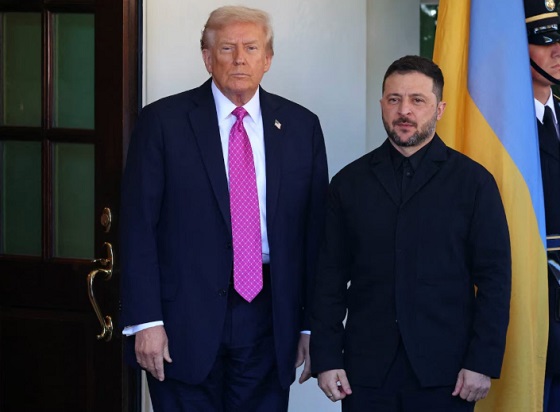
By John Leake
The President meets with the Ukrainian dictator but prudently declines to give him the long range missiles he seeks.
Yesterday, after seeing reports of Zelensky meeting with Raytheon executives before his scheduled meeting with President Trump at the White House, I wrote an essay expressing my dismay at how the President has—since he entered office eight months ago—walked back his campaign promise to end the war in Ukraine. Instead, he has recently made statements suggesting a willingness to escalate the war, most notably by giving Ukraine long range missiles that can be armed with nuclear warheads.
Some of my readers objected to my suggestion that the U.S. government’s relationship with Ukraine is now so corrupt that Zelensky could get the missiles he seeks without following proper legal procedures. They should consider that the U.S. government has sent billions of money and weapons to Ukraine—long ruled by a money-laundering oligarchy —without any accounting.
Now comes the news that President Trump walked back his Tomahawk tease in his meeting with Zelensky. As he put it:
That is why we are here. Tomahawks are very dangerous… It could mean escalation – a lot of bad things could happen. Hopefully we will be able to get this war over with without thinking about Tomahawks. I think we are pretty close to that.
We thank President Trump for his prudence and we hope he will continue on the same path of prudence.
Yesterday, our NATO partner Poland allowed the alleged Ukrainian lead perpetrator of the Nord Stream pipeline bombing to walk free. Such is the fantastically corrupt world in which we are now living.
The war in Ukraine is yet another species of globalist, criminal humbug that in no way serves the interests of the American people. Consider that, while we constantly hear about the “existential threat” of climate change from carbon emissions, there has been no talk in the media—including the hysterical “climate change” German media—about the fact that the Nord Stream sabotage released between 150 million and 300 million cubic meters of gas—the equivalent to roughly 5.3 to 11 billion cubic feet.
This was the largest single industrial release of natural gas, which is largely composed of methane, widely characterized as a potent “greenhouse gas.” Bill Gates is always prattling on about the need to get rid of cattle because the ruminants release methane. I haven’t heard him say a word about Nord Stream.
If I were President Trump, I would tell Zelensky the following:
1). You and your predecessors should have never listened to the idiot U.S. foreign policy establishment of my predecessors—an establishment that has ruined every country it has touched since Vietnam. Every single blowhard Neocon foreign policy wonk in this city is a total retard.
2). I am going to use my executive power—provided by the U.S. Constitution—to end the reckless and criminal foreign policies of my predecessors, including their insane policies with respect to Russia and Ukraine since the Cold War ended in 1991.
3). The United States has always maintained elections, even in wartime, and I was elected to end U.S. involvement in your war against Russia.
4). The American people I represent have no quarrel with the Russian people, and they therefore object to American weapons being used to kill Russians. To give you long range missiles to use against Russia would significantly elevate the risk of the Russians eventually using their long range missiles to strike American targets.
5). I am bound by my oath to uphold the U.S. Constitution to serve the American people, and not the interests of warring parties 5,000 miles away, on the other side of the Atlantic Ocean.
6). I will assist you in peace negotiations with the Russians, but I will not escalate this conflict in a gambit to extract better concessions from Russia. Such an escalation will only result in more needless death and destruction, and it risks spinning out of control—a scenario deemed to be unacceptably risky during the Cold War.
7). I intend to inaugurate a new era of friendship and cooperation between the U.S. and Russia, based on the interests of our people, and not the U.S. national security state and Military Industrial Complex that President Eisenhower warned about in 1961. This Establishment has doggedly maintained a state of enmity with Russia for its own selfish interests.
8). I will offer Russia numerous incentives to give Ukraine a fair deal in peace negotiations, but effective immediately, I am terminating all military aid to Ukraine, as well as all military intelligence and targeting assistance.
9). Here’s a $7,000 cash gift from me to you as private pals. Please stop by Anderson & Sheppard tailor in London on your way back to Kiev and get fitted for a suit. You look ridiculous in that silly outfit and you’ll need a suit for our Budapest summit with Vladimir.
Please subscribe to FOCAL POINTS (Courageous Discourse).
For the full experience, upgrade your subscription.
Business
UN, Gates Foundation push for digital ID across 50 nations by 2028

From LifeSiteNews
With 30 nations enrolled, the UN and Gates Foundation’s digital ID campaign signals accelerating efforts to create a global digital infrastructure that centralizes identity and data.
The 50-in-5 campaign to accelerate digital ID, fast payment systems, and data exchanges in 50 countries by 2028 reaches a 30 country milestone.
Launched in November 2023, the 50-in-5 campaign is a joint effort of the United Nations, the Bill and Melinda Gates Foundation, and their partners to rollout out at least one component of Digital Public Infrastructure (DPI) in 50 nations within five years.
DPI is a civic technology stack consisting of three major components: digital ID, fast payment systems, and massive data sharing between public and private entities.
30 countries have now joined the UN/Gates 50-in-5 DPI campaign to rollout Digital ID, Fast Payment Systems & Massive Data Exchanges between public & private entities https://t.co/dOYCfQHObt pic.twitter.com/yP6V7zxnUD
— Tim Hinchliffe (@TimHinchliffe) October 2, 2025
50-in-5 started with 11 first-mover countries, and with the count now at 30 the participating countries include:
Bangladesh, Brazil, Cambodia, Dominican Republic, Estonia, Ethiopia, France, Guatemala, Jamaica, Kazakhstan, Lesotho, Malawi, Mexico, Moldova, Nigeria, Norway, Senegal, Sierra Leone, Singapore, Sri Lanka, South Africa, South Sudan, Somalia, Togo, Trinidad and Tobago, Uganda, Ukraine, Uruguay, Uzbekistan, and Zambia.
The 50-in-5 campaign celebrated its 30-country milestone during a sideline event at the U.N. General Assembly in New York on September 22.
There, government officials, like Ukraine’s deputy prime minister, praised the work of 50-in-5 while the ministers of digital economy from Nigeria and Togo called for an interoperable digital identity system for the entire African continent.
Nigeria’s Minister of Communications, Innovation and Digital Economy Bosun Tijani said that each country could build their own digital identity scheme, but that they should all be interoperable with one another – demonstrating both the digital ID and data sharing as good potential use cases for DPI.
“Nations want to maintain their own ID databases, but I think we have a unique opportunity to apply strong data exchange system interoperability,” said Tijani.
“I think a digital identity system that can go with you wherever you are going on the African continent would be a fantastic example,” he added.
Nigeria's minister of Communications, Innovation & Digital Economy Bosun Tijani calls for Digital ID to be interoperable across all Africa: "A digital identity system that can go with you wherever you go on the African continent will be fantastic." 50-in-5 https://t.co/dOYCfQHObt pic.twitter.com/KB380uQrmd
— Tim Hinchliffe (@TimHinchliffe) October 2, 2025
In March 2025, the Nigerian government published a framework to develop national Digital Public Infrastructure that would leverage digital ID to track and trace “key life events” of every citizen from the cradle to the grave.
“Throughout a citizen’s life, from birth to old age, there are marked moments of significant life events requiring support or service from the government,” the paper begins.
“Some of these services include registration of births, antenatal healthcare, vaccines, school enrollment, scholarships, health insurance for business registrations, filing of taxes, etc.”
These “life events” require every citizen to have a digital ID:
The Federal Government of Nigeria is on a mission to appropriately deploy digital technology to support Nigerians through these significant and profound moments so they can integrate into the state and enjoy the benefits of citizenhood from cradle to old age.

Back at the 50-in-5 milestone event, Togo’s Minister of Digital Economy and Transformation Cina Lawson called for a free, cross-border, interoperable digital ID powered by the Modular Open Source Identity Platform (MOSIP).
MOSIP is a Gates-funded platform that “helps govts & other user organizations implement a digital, foundational identity system.”
Said Lawson, “We’ve initiated conversations with our neighbors, namely Benin, to have interoperability of our ID systems, but also Burkina Faso and other countries such as Senegal, because we’re using MOSIP platform, so what we do is that we host meetings of countries that are interested the platform, so that we could see how we [are] operating it and so on.”
“Our ID system, using the MOSIP platform, is really the ID that the majority of the Togolese will have because first of all it’s free, it doesn’t require to show proof of citizenship, and so on, so that is the ID card of the poorest of the Togolese,” she added.
Togo’s Minister of Digital Economy & Transformation Cina Lawson calls for free, cross-border, interoperable Digital ID using Gates-funded MOSIP platform. UN/Gates 50-in-5 event https://t.co/dOYCfQHObt pic.twitter.com/wPC4vpms9l
— Tim Hinchliffe (@TimHinchliffe) October 2, 2025
Lawson also spoke at the 50-in-5 launch event in November 2023, where she explained that Togo’s DPI journey began with the arrival of COVID-19.
First, the government set up a digital payments system within 10 days.
“We deployed it, and we were able to pay out 25 percent of all Togolese adults, and we distributed $34 million that the most vulnerable Togolese received directly through their mobile phones,” said Lawson.
Then, came vaccine passports.
“We created a digital COVID certificate. All of a sudden, the fight against the pandemic became really about using digital tools to be more effective,” she added at the time.
Today, Togo became the first sub-Saharan African country whose digital COVID-19 vaccination certificate is recognized by the @eu_commission. Travelers with a Togolese certificate will be able to validly present it in the EU & vice versa. @AmbUETogo @KoenDoens pic.twitter.com/Uy9mRF8bkU
— Cina Lawson (@cinalawson) November 24, 2021
To get an idea where DPI is heading, Ukraine’s Deputy Prime Minister Myhailo Fedorov gave a pre-recorded speech for the 50-in-5 milestone event, saying that his country was successful in building “the state in a smartphone” via the DIIA app, which had reached 23 million users.
“For every citizen, government should be simple, convenient, nearly invisible, and accessible in just a few clicks,” said Fedorov.
“Today, 23 million people use the DIIA app […] Since the launch of DIIA in 2020, Ukrainians and the state have saved about $4.5 billion to date.”
“This is the combined anti-corruption and economic effect of digitalizing services.”
“For us, it’s powerful proof of DIIA’s efficiency and the real impact of building a digital state,” he added.
Ukraine Deputy PM Mykhailo Fedorov praises DIIA Digital ID app, with 23M users, for being a "STATE IN A SMARTPHONE" & "BUILDING AN (INVISIBLE) DIGITAL STATE." An "ANTI-CORRUPTION/ECONOMIC EFFECT OF DIGITALIZING SERVICES." Includes "ONLINE MARRIAGE" 50-in-5 https://t.co/dOYCfQHObt pic.twitter.com/MUFwbW4Yyy
— Tim Hinchliffe (@TimHinchliffe) October 3, 2025
Speaking at the World Economic Forum (WEF) Global Technology Governance Summit on April 7, 2021, Fedorov told the panelists of the “Scaling Up Digital Identity Systems” session, that it was Ukraine’s goal to “enable all life situations with this digital ID.”
“The pandemic has accelerated our progress […] People have no choice but to trust technology,” Fedorov said at the time.
“We have to make a product that is so convenient that a person will be able to disrupt their stereotypes, to break through from their fears, and start using a government-made application,” he added.
The 50-in-5 campaign is a collaboration between the Bill and Melinda Gates Foundation, the United Nations Development Program, the Digital Public Goods Alliance, the Center for Digital Public Infrastructure, and Co-Develop; with support from GovStack, the Inter-American Development Bank, and UNICEF.
The Center for Digital Public Infrastructure is backed by Co-Develop and Nilekani Philanthropies.
Nandan Nilekani is one of the architects of India’s digital identity system, Aadhaar.
Co-Develop was founded by The Rockefeller Foundation, the Bill & Melinda Gates Foundation, Nilekani Philanthropies, and the Omidyar Network.
The Omidyar Network is a funder of MOSIP.
The Digital Public Goods Alliance lists both the Gates and Rockefeller foundations in its roadmap showcasing “activities that advance digital public goods,” along with other organizations and several governments.
At last year’s Summit of the Future, 193 nations agreed to the non-binding “Pact for the Future,” which dedicates a section in its annex, the “Global Digital Compact,” to implement DPI in member states.
One year later, the U.K. announced it was going to force Britons into mandatory digital ID schemes under the guise of combatting illegal immigration.
Reprinted with permission from The Sociable.
-

 Red Deer24 hours ago
Red Deer24 hours agoThe City of Red Deer’s Financial Troubles: Here Are The Candidates I Am Voting For And Why.
-

 Business11 hours ago
Business11 hours agoUN, Gates Foundation push for digital ID across 50 nations by 2028
-

 COVID-1912 hours ago
COVID-1912 hours agoThe Trials of Liberty: What the Truckers Taught Canada About Power and Protest
-
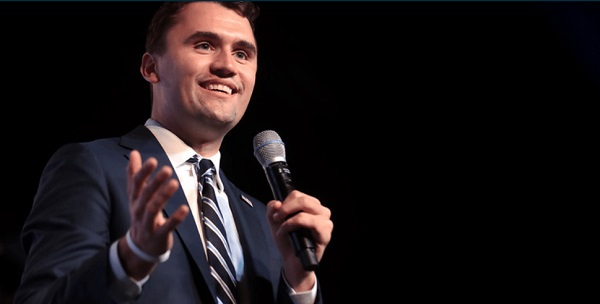
 C2C Journal11 hours ago
C2C Journal11 hours agoCharlie Kirk and the Fragility of Civic Peace
-

 Business2 days ago
Business2 days agoCutting Red Tape Could Help Solve Canada’s Doctor Crisis
-
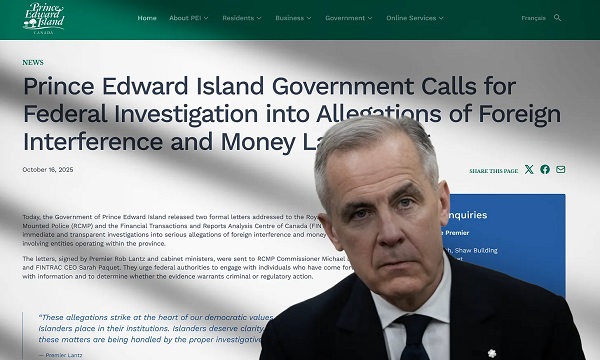
 espionage1 day ago
espionage1 day agoPEI to Ottawa: Investigate CCP Footprints—Now
-
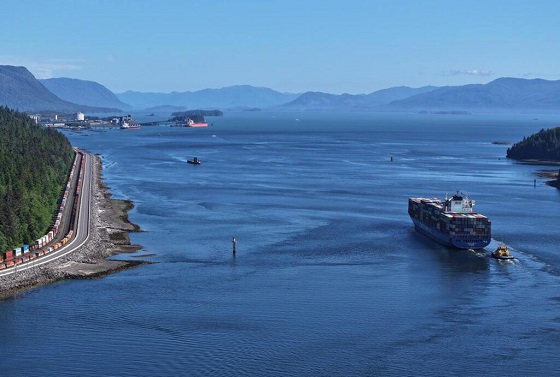
 Energy2 days ago
Energy2 days agoPrince Rupert as the Optimal Destination Port for an Alberta Crude Oil Pipeline –
-
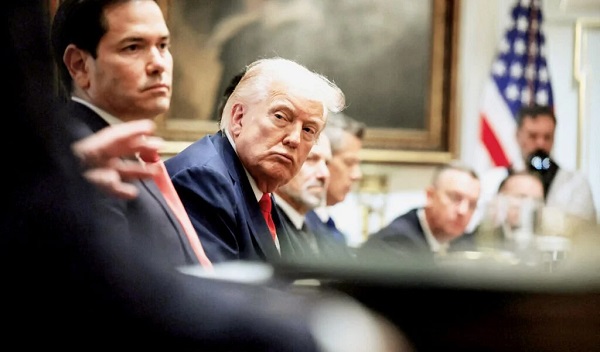
 Bruce Dowbiggin2 days ago
Bruce Dowbiggin2 days agoBrokeback President: We Can’t Quit You, Donald








